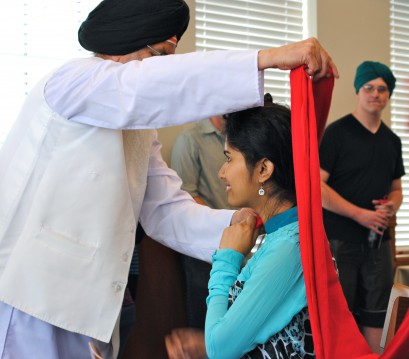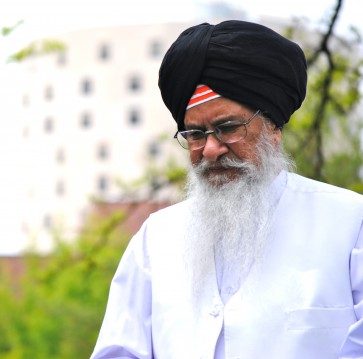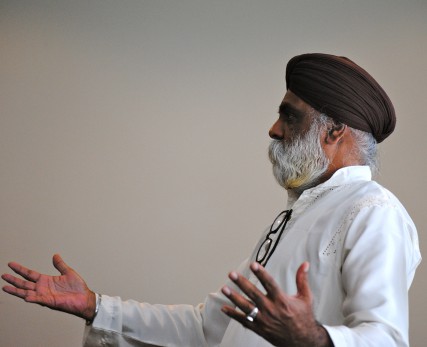TALK BACK | SUBMIT NEWS ITEM | LEAVE A COMMENT

CHENEY — Evangelicals, Catholics and nones (non-religious) dominate Spokane. So Baldev Singh isn’t bothered when he gets quizzical looks or double takes from strangers. It’s not his olive skin or full beard that turn heads, it’s usually his turban.
Singh, a member of the Sikh Temple of Spokane, told a small group of Eastern Washington University students on Tuesday that wearing a turban is a testimony of his faith and said he’s been lucky that Spokanites have never spoken boorishly to him because of it.
About 400,000 Sikhs live in America and according to a Harvard University project, most have experienced a hate crime or incident since Sept. 11, or know of someone who has.R. Skyler Oberst, president emeritus of EWU’s Compassionate Interfaith Society, said that’s exactly why the group hosted Turban Day: Unwrapping Sikhism.
“The turban seems to be a loaded symbol in America after Sept. 11,” said Oberst. “The reason we’re meeting today is to dispel those rumors and provide accurate and respectful information on all religions.”

There are six Sikh temples in Washington. About 70 families attend Spokane’s temple. Four members spent the day at the university, wrapping student’s heads in authentic turbans, sharing a meal with them, discussing the Sikh faith and praying.
Singh said the turban is one of five articles of faith, called Kakaars, mandated by the 10th Sikh guru, Gobind Singh Ji. It’s a part of him, just like his right arm is, he said.
“Because Sikhism is such a small religion there’s a misunderstanding about the Sikh turban,” Singh said.
He blames it partly on the media, flashing images of Osama bin Laden over and over again. Although bin Laden wore a turban, most Muslims don’t. Ninety percent of men wearing turbans in the U.S. are Sikh, Singh said. But the images of bin Laden, he noted, have caused the turban to have a negative connotation.
“The best way to overcome this (fear) is to understand it. If you understand it’s a symbol of faith, then it makes much more sense,” he said.
Rob Sauders, professor of anthropology, geography and history, said many Americans don’t understand that several faiths, including Christianity, also have a tradition of covering one’s head.

“It’s religious illiteracy,” he said, adding that ignorance can be overcome through events like Turban Day.
Singh agreed.
“The people who are going to become champions, in my mind, are those who embrace diversity,” he said.
View a photo gallery of this event here.
Oberst is a SpokaneFAVS contributor.
Tracy Simmons: tracysimmons@favs.news, (509) 240-1830 or
Find SpokaneFAVS on Twitter (@SpokaneFAVS) or Facebook







